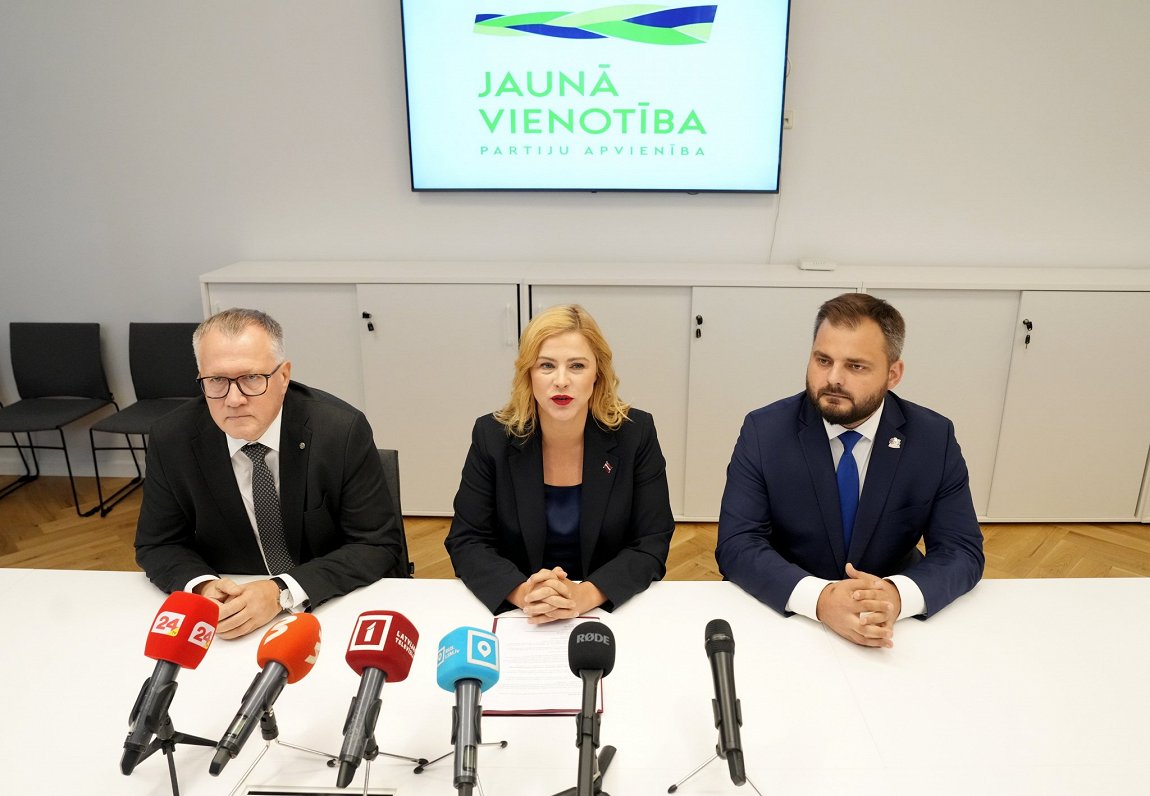It means that a week later, months of inter-party wrangling and informal deal-making that began in the run-up to Rinkēvičs' election as president may finally be reaching a conclusion, though given the outcome it is questionable whether stability will be restored for long.
Indeed, what started out as Prime Minister Krišjānis Kariņš' claimed desire to form a "broader" and "more dynamic" coalition much less than a year after he formed a three-party coalition with New Unity alongside the United List and National Alliance seems to have resolved itself into a new coalition that is arguably neither wider nor more dynamic than what it replaces.
The outgoing coalition consisted of a centrist party (New Unity), a conservative grouping (United List) and a right-of-center party (National Alliance). The new one, if approved, would consist of a centrist party (New Unity), a conservative grouping (ZZS) and a left-of-center party (Progressives). While it might be argued that that represents a slightly different – if not exactly 'broader' – part of the political spectrum, it is still just three parties and it actually sees the government parliamentary representation shrink from an already-narrow 54 seats out of 100 to an even thinner 52 seats, making it vulnerable to rebels, defections and the vicissitudes of fate.
As for dynamism, the Progressives are certainly eager for a shot at holding power for the first time and initiating radical social reforms such as legalized same-sex partnerships, but whether ZZS and their traditionalist agrarian ideology can be described as dynamic is perhaps open to question.
When asked on Friday whether 52 votes for a potential coalition are enough, Siliņa laconically stated that 52 votes is a majority.
She also suggested that there is always a chance to get additional votes, saying "If we work well, maybe there will be deputies who want to join us" – ignoring the fact that such a strategy can work both ways.
Siliņa also admitted that with 52 votes in the Saeima, it will be necessary to think about the work of factions, scheduling business trips, and a certain work rhythm discipline will have to be observed, but "this is only understandable, MPs have to work".
Siliņa repeatedly emphasized that she invested a lot of time and energy attempting to build a wider coalition but right now "it's not a good time for empty talk and long tango dances."
She explained that she wants to create policies that are not based on just talking, and while communication with the public is important, she wants to do things, so it is important to have a team of ministers who work, not find reasons not to do something.
"I want to lead this Cabinet of Ministers if I manage to form this government," said Siliņa.
The Lembergs factor
As reported earlier by LSM, the "United List" rejected participation in Silina's government, declaring that it will not support "an unstable government that weakens national security and international reputation with the decisive influence of [ZZS politician Aivars] Lembergs". Lembergs, former mayor of Ventspils is sanctioned by the U.S. government, is serving a five-year prison sentence for various serious graft charges and was famously descibed by a previous president from his own party as a national security risk. He continues to have close ties to ZZS, which never disowned him even when he was convicted and led to prison in handcuffs, and it remains to be seen whether Latvia's allies in general and the U.S. in particular are satisfied that his influence will not extend into executive power as it has before.
New Unity's willingness now to work with ZZS runs counter to some of its previous positions on not cooperating with oligarch-influenced parties and, it might be argued, has in fact helped rehabilitate ZZS' reputation. The moral high ground formerly occupied by New Unity has now been claimed by the United List, which has underlined that it has deep reservations about cooperating with ZZS. Indeed, many of its most prominent members are former ZZS members who grew weary of constant association with Lembergs.
Silina emphasized that she is not going to allow Lembergs' influence on the government, not only in connection with his participation in decision-making, but "in general, I also want to see the principles of good corporate governance in the ministries".
On Monday, New Unity will start working with ZZS and the Progressives on a government declaration, Siliņa announced.
Siliņa said that, in addition to the coalition agreement, it is also planned to create an annex with the works to be done already this fall and next year's works and deadlines, which, nevertheless, may change as the situation develops.
She promised not to dawdle with the government formation process, saying "The dance is over", with a Saeima vote on forming a new government potentially possible on September 15.





























